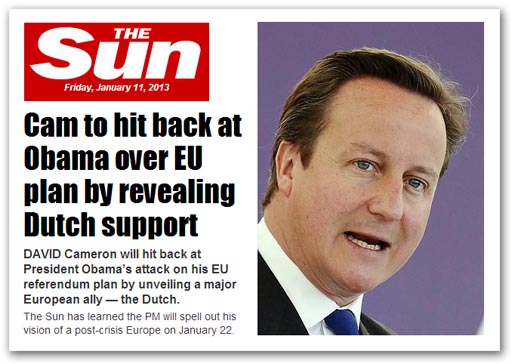We are also told by the totally reliable and scrupulously honest Tom Newton Dunn, that Mr Cameron will be enlisting the support of Dutch leader Mark Rutte, who will "back his bid to fight for powers and money to be returned to nation states".
Thus, is would appear that the stage is set for another round of fantasy politics: "After a major renegotiation", writes TND, "Mr Cameron will then finally offer the British people an In or Out say, probably around 2018". Here, one notes in passing, is another hack who isn't thinking through the implications of a five-year delay. But then, no one goes to The Sun for its thinking.
To get an insight into the latest instalment of the "Europe" soap opera, however, one has to ignore the Dutch for the moment and go German. Die Welt has interviewed George Osborne, who has been in Berlin meeting Wolfgang Schäuble.
Osborne tells the paper he very much hopes the UK will remain a member of the EU but, in order to stay in the European Union, the EU needs to change. "British people are very disappointed with the EU, and the people have the feeling that too many decisions are taken too far away in Brussels. Our citizens wonder whether Europe can really solve their most pressing problems and create jobs and wealth".
Although, as a guess, one would venture that very few "citizens" wonder whether "Europe" can solve any problems at all, having long been of the opinion that chocolate fireguards are more useful, Osborne nevertheless wants to be "an active part of a reformed EU".
Europe and the UK, he then goes on to say - eliding "Europe" with the EU - "need each other and our economies are closely intertwined". He tells us: "More than half of Britain's exports go to the EU (meaning EU member states), we sell more to North Rhine-Westphalia than to India. British companies employ 200,000 people in Germany, 400,000 Britons work for German companies in Britain".
With that, we suddenly realise which language these people are using. It isn't Dutch, or double-Dutch, it's doublespeak. Our politicians don't inhabit the same world as us. Why should they use the same language?
COMMENT THREAD
With that, we suddenly realise which language these people are using. It isn't Dutch, or double-Dutch, it's doublespeak. Our politicians don't inhabit the same world as us. Why should they use the same language?
COMMENT THREAD
